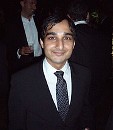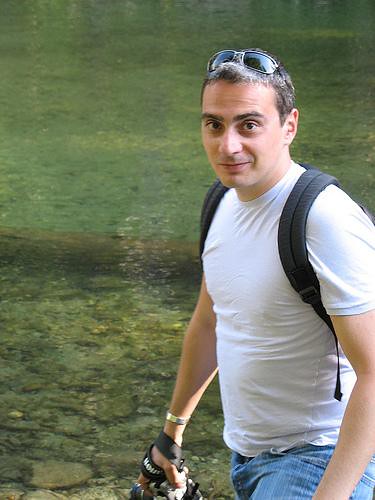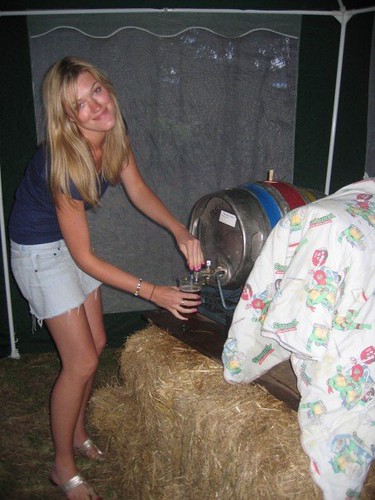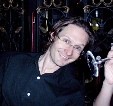IAB Debate: Are Creative Agencies Moving with the Times?
Went to an IAB run debate last night sponsored by the Guardian.
The theme of the debate was whether creative agencies are developing with the changing consumer landscape.
Although the obvious response would be to look at the old dinosaurs represented by agencies such as JWT, Grey &c, the debate was whether digital agencies were losing their grip on the future.
It seems strange to me that agencies need to ask themselves this sort of question. Digital creative agencies are leading a sector of the industry that grew a breathtaking 65% last year and is on course to grow even more this year.
However, there were some good points raised on both sides.
The introduction and chairing was run by Kieron Matthews, the head of marketing at the IAB. I was genuinely impressed by his knowledge of the industry.
The side arguing that creative agencies had, in fact, moved with the times was represented by three relative heavyweights.
They Are Moving With The Times
Steven Filler (Guardian Head of Digital Advertising and Sponsorship) outlined his thoughts:
He has been impressed with the quality of the advertising coming through when compared with the last couple of years. Surprisingly, he sees that media owners and digital creative agencies need to work closer together.
There is a convincing argument that media owners and creative agencies can work well together. Media owners know about the technical possibilities of the media space and the creative agencies know what they can do with those technical possibilities. The fact that the creative agencies are less well equipped to negotiate these deals was ignored...
He moaned that media agencies weren't moving forward - they wouldn't give the Guardian enough money for their funky new ideas. He said media owners are the people 'closest to the customer.' Therefore they could be more involved in the creative process.
Flo Heiss (Creative Partner at Dare)
According to Flo, the industry is definitely in the process of evolving. His agency, Dare, is currently restucturing to get rid of the creative department. Digital and interactive creative requires a merging of both ideas and technical. He would like to see 'digital agency' replaced with the name 'interactive agency' to show that the industry isn't just about the internet.
The important point is that digital agencies are now moving beyond the business models used in old traditional agencies.
Becky Power (Head of Art at Modem Media)
She wanted to emphasise that the digital creative agencies are not arrogant like the old traditional agencies (there was a large amount of hate towards the traditional agencies). Digital agencies are 'miles ahead of the traditional agencies' but complained that 'media agencies are not moving forward'. She also had a quick moan that at all agency meetings digital agencies aren't treated as equals. Some people had the cheek to lump them into the same box as DM agencies.
Luckily digital agencies aren't at all arrogant. Digital agencies are 'always pushing the limits' even while these 'limits are always changing'. They are able to do this because the Digital agencies are the people 'closest to the customer.'
They Aren't Moving With The Times
Laura Jordan Bambach (Head of Art, Glue)
The overall image that Laura painted was that the industry's problems stemmed from the 'lean years'. The main focus of the problem is that digital agencies used to be desparate for moneny and desparate for attention. This lead to a combination of undercharging and overdelivery, leading to a devaluation of digital services and attrition of margins.
She sees a host of people 'talking big and acting small'. This then leads to a credibility gap with some clients, this could be a problem for the whole industry.
Laurent Ezekiel (Client Services Director, Wheel)
Argued that the problem was in the charging model. He charges his clients based mainly on hours. This is unrealistic and holds down margins - it makes it difficult for Wheel to show or extract the true value of the work they create.
He thought there was a bit too much complacency and emphasised the need for digital agencies to be stronger with their clients. He bemoaned the fact that very little creative planning goes on within the creative agencies - there's a feeling that this could be a service that would be valued by clients.
He also berated the creative output of some of his compeititor agencies, moaning that some of the creative out there could be described as 'average at best'.
Matt Dyke (Planning Director, Tribal DDB)
By far the most impressive speaker at the event.
He used the analogy of a frog, which was brave. According to urban legend, frogs can be boiled alive without noticing. If the temperature is raised gradually over time, the frog will not notice until its enymes are slowly denatured and the cell membranes slowly rupture. Sounds unlikely.
In his view, digital creative agencies are being boiled alive by a number of different sources:
Alessandra Lariu (Senior Creative, Agency Republic)
She also thought we should begin calling Digital agencies 'interactive agencies.' Her main gripe seemed to be about gender imbalance within agencies. Although the creative teams are moving towards gender parity, she moaned that they were having difficulties finding a good number of female programmers and techies.
The things everyone agreed on:
Luckily there was free beer otherwise this would have been a dissapointing night.
The theme of the debate was whether creative agencies are developing with the changing consumer landscape.
Although the obvious response would be to look at the old dinosaurs represented by agencies such as JWT, Grey &c, the debate was whether digital agencies were losing their grip on the future.
It seems strange to me that agencies need to ask themselves this sort of question. Digital creative agencies are leading a sector of the industry that grew a breathtaking 65% last year and is on course to grow even more this year.
However, there were some good points raised on both sides.
The introduction and chairing was run by Kieron Matthews, the head of marketing at the IAB. I was genuinely impressed by his knowledge of the industry.
The side arguing that creative agencies had, in fact, moved with the times was represented by three relative heavyweights.
They Are Moving With The Times
Steven Filler (Guardian Head of Digital Advertising and Sponsorship) outlined his thoughts:
He has been impressed with the quality of the advertising coming through when compared with the last couple of years. Surprisingly, he sees that media owners and digital creative agencies need to work closer together.
There is a convincing argument that media owners and creative agencies can work well together. Media owners know about the technical possibilities of the media space and the creative agencies know what they can do with those technical possibilities. The fact that the creative agencies are less well equipped to negotiate these deals was ignored...
He moaned that media agencies weren't moving forward - they wouldn't give the Guardian enough money for their funky new ideas. He said media owners are the people 'closest to the customer.' Therefore they could be more involved in the creative process.
Flo Heiss (Creative Partner at Dare)
According to Flo, the industry is definitely in the process of evolving. His agency, Dare, is currently restucturing to get rid of the creative department. Digital and interactive creative requires a merging of both ideas and technical. He would like to see 'digital agency' replaced with the name 'interactive agency' to show that the industry isn't just about the internet.
The important point is that digital agencies are now moving beyond the business models used in old traditional agencies.
Becky Power (Head of Art at Modem Media)
She wanted to emphasise that the digital creative agencies are not arrogant like the old traditional agencies (there was a large amount of hate towards the traditional agencies). Digital agencies are 'miles ahead of the traditional agencies' but complained that 'media agencies are not moving forward'. She also had a quick moan that at all agency meetings digital agencies aren't treated as equals. Some people had the cheek to lump them into the same box as DM agencies.
Luckily digital agencies aren't at all arrogant. Digital agencies are 'always pushing the limits' even while these 'limits are always changing'. They are able to do this because the Digital agencies are the people 'closest to the customer.'
They Aren't Moving With The Times
Laura Jordan Bambach (Head of Art, Glue)
The overall image that Laura painted was that the industry's problems stemmed from the 'lean years'. The main focus of the problem is that digital agencies used to be desparate for moneny and desparate for attention. This lead to a combination of undercharging and overdelivery, leading to a devaluation of digital services and attrition of margins.
She sees a host of people 'talking big and acting small'. This then leads to a credibility gap with some clients, this could be a problem for the whole industry.
Laurent Ezekiel (Client Services Director, Wheel)
Argued that the problem was in the charging model. He charges his clients based mainly on hours. This is unrealistic and holds down margins - it makes it difficult for Wheel to show or extract the true value of the work they create.
He thought there was a bit too much complacency and emphasised the need for digital agencies to be stronger with their clients. He bemoaned the fact that very little creative planning goes on within the creative agencies - there's a feeling that this could be a service that would be valued by clients.
He also berated the creative output of some of his compeititor agencies, moaning that some of the creative out there could be described as 'average at best'.
Matt Dyke (Planning Director, Tribal DDB)
By far the most impressive speaker at the event.
He used the analogy of a frog, which was brave. According to urban legend, frogs can be boiled alive without noticing. If the temperature is raised gradually over time, the frog will not notice until its enymes are slowly denatured and the cell membranes slowly rupture. Sounds unlikely.
In his view, digital creative agencies are being boiled alive by a number of different sources:
- Traditional agencies beginning to tool up digital capabilities
- Consumer generated content - how can content that costs money compete?
- Online clients who already know what they're doing (e.g. Apple, Amazon, eBay)
- Suicide - ineffectual remuneration models, wage inflation...
Alessandra Lariu (Senior Creative, Agency Republic)
She also thought we should begin calling Digital agencies 'interactive agencies.' Her main gripe seemed to be about gender imbalance within agencies. Although the creative teams are moving towards gender parity, she moaned that they were having difficulties finding a good number of female programmers and techies.
The things everyone agreed on:
- Remuneration model needs some work. This is something Campaign has been banging on about for the overall industry, so it would be interesting to see if a digital agency can solve this
- Recruitment of females. I agree that more women would be nice.
- Overdelivery - there's still a feeling that digital agencies are overly keen to deliver and be seen to deliver
- Education of clients - they want budgets that would allow them to do all the cool things they keep on dreaming up. It seemed that the problem was from both sides, the client doesn't give them much money. This is then followed by them not pushing ideas that would exceed the client's budget for digital.
- Media agencies - there was an ongoing moan that overall digital ad spend had increased, but revenue for digital creative agencies not risen in line with it. There was also the feeling that too many media agencies just 'give them a schedule, it's not a full partnership'
- Offline can be called ATL. It was quite sad to see a whole room of digital creative people not even questioning this whole ATL nonsense. They're offline agencies, not above the line agencies. Separate it out into online \ offline and brand \ direct.
Luckily there was free beer otherwise this would have been a dissapointing night.










0 Comments:
Post a Comment
<< Home